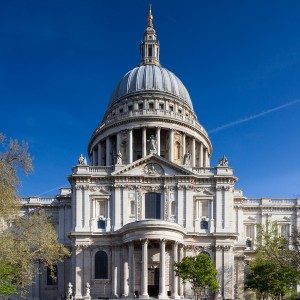 My latest book, Vanishing Grace, explores how Christians relate to the broader culture, which got me thinking about how words flow back and forth in a linguistic exchange between the sacred and the profane. (I am using profane in its original meaning of nonreligious—the word comes from Latin, “outside the temple”—not in its modern sense of vulgar or irreverent.)
My latest book, Vanishing Grace, explores how Christians relate to the broader culture, which got me thinking about how words flow back and forth in a linguistic exchange between the sacred and the profane. (I am using profane in its original meaning of nonreligious—the word comes from Latin, “outside the temple”—not in its modern sense of vulgar or irreverent.)
Although the English language took shape in a religious era, over time the culture has grown more secular. As a result, some words in common use today have only faint echoes of their origin in the sacred.
- Carnival, from the Latin carne, means literally “to remove meat,” and marked the season just before Lent. Now it applies to country fairs in small towns and a big bash in Brazil.
- Gospel. A word that means “good news,” and traditionally a shorthand for the Christian message, now underscores any authority or truth: “In our house, whatever my father said was gospel.”
- Bible. Much like gospel, this word has expanded to anything authoritative, such as “the bible of French cooking” or “the bible of dog training.”

- Clerk. Bank tellers and legal assistants may not know they inherited their job title from the Middle Ages, when few but monks could write (see also clergy and clerical).
- Evangelist. Silicon Valley has co-opted this religious term in favor of anyone who spreads “good news” about the latest software or high-tech gadget.
- Redeem. Once associated with such heavy topics as the doctrine of the Atonement and the emancipation of slaves, now the word describes mundane acts like recycling bottles and cashing in coupons.
- Maudlin. Short for Mary Magdalene, the woman with a troubled history who wept at Christ’s tomb, this word now connotes excessive sentimentality. Locals refer to Magdalen College of Oxford University, where C. S. Lewis taught for thirty years, as “Maudlin” College.
- Assassin. This one stems from Islamic, not Christian history. In the 11th century, a violent Shi’ite sect specialized in killing leaders in broad daylight in order to spread terror. (The more things change…) Many scholars believe the word descends from “hassasin” because sect members took hashish to steel themselves for the suicide attacks.
I could go on. Governments name their departments ministries; the military speaks of mission creep and corporations compose mission statements. The Apostle Paul would be shocked to learn that many modern Greeks use the once-lofty word agape for the act of making love. The borrowing goes both ways between sacred and secular: rosary comes from rose garden, a metaphor for a garden of prayers.
In times of strong faith, even people’s names offer a chance for evangelism. The Puritans gave their children names like Reformation, Tribulation, Eschew Evil (imagine!), Purity, and Chastity. On my travels I find a similar pattern at work today; I’ve met Africans named Shadrach, Meshach, Abednego, Precious, Witness, Blessed, and Heaven. They stand in good biblical tradition. As Frederick Buechner notes, Hosea named his children “queer names like Not-pitied-for-God-will-no-longer-pity-Israel-now-that-it’s-gone-to-the-dogs so that every time the roll was called at school, Hosea would be scoring a prophetic bullseye in absentia.”
Christians find ways to soften words that are used irreverently or may cause offense: Gee for “Jesus”; Heck for “Hell”; Gosh for “God”; dang or darn for “damn.” Conscious of Arab sensitivities, the organization Campus Crusade changed its name to Cru, and Wheaton College replaced its long-standing “Crusaders” mascot with Wheaton Thunder.
 My favorite story on the fluidity of language harks back to 1711, the year Christopher Wren finished work on the majestic St. Paul’s Cathedral, rebuilt after the great London fire. Versions of the story differ, but in one account Wren gave a personal tour to the King Charles II, who observed the building in silence, causing Wren no little anxiety.
My favorite story on the fluidity of language harks back to 1711, the year Christopher Wren finished work on the majestic St. Paul’s Cathedral, rebuilt after the great London fire. Versions of the story differ, but in one account Wren gave a personal tour to the King Charles II, who observed the building in silence, causing Wren no little anxiety.
At the conclusion the monarch pronounced the new St. Paul’s “awful, amusing, and artificial.” Instead of blushing in shame, Wren knelt before him with relief and gratitude, for in those days awful meant “fills me with awe,” amusing meant amazing, and artificial meant artistic. (I like to recite this story to those who insist on using the King James Version of the Bible, which relies on language from 1611, a century earlier.)
Words change, language evolves. In my lifetime the word gay has shifted from meaning merry to an almost exclusive association with homosexuality. I have heard estimates that 80 percent of the time words pejorate (think pejorative) or mean something worse, whereas only 20 percent of the time words improve or elevate to a higher meaning (ameliorate is the technical term). For example, most of the slang terms for sex acts or private parts were once perfectly respectable words that have since pejorated. Modern youth culture complicates the pattern by using negative words—sick, insane, wicked, nasty, killer, gnarly, stupid—to mean positive things.
Language’s tendency to pejorate certainly applies to words rooted in religious faith or used in earlier versions of the Bible. Consider:
- Paternoster. Worshipers would say the Lord’s Prayer, or “Our Father,” in Latin so quickly and mechanically that it came to mean meaningless chatter, thus birthing the word patter.
- Silly. The original Anglo-Saxon word meant one who was happy and blessed. But a true “innocent” may also be naive, or lacking in discernment, and over time the word soured.
- Idiot began as a derivative of a Greek word describing a person peculiar in an admirable way, someone private and non-conformist. Eventually the word became so peculiar that no one wanted to be an idiot.
 Pity has the same root as “piety,” and once described the quality of someone who, like God, showed compassion on the less fortunate. Over time, however, the emphasis shifted from the pietistic giver to the object of pity, who was seen as weak or inferior. A similar degeneration occurred with charity, which King James translators had chosen to convey the highest form of agape love. Alas, both words have badly slipped, so that now we hear the protests, “Don’t pity me!” and “I don’t want your charity!”
Pity has the same root as “piety,” and once described the quality of someone who, like God, showed compassion on the less fortunate. Over time, however, the emphasis shifted from the pietistic giver to the object of pity, who was seen as weak or inferior. A similar degeneration occurred with charity, which King James translators had chosen to convey the highest form of agape love. Alas, both words have badly slipped, so that now we hear the protests, “Don’t pity me!” and “I don’t want your charity!”- “Suffer the little children to come unto me,” Jesus said, as the King James Version has it, and elsewhere in Mark he “would not suffer that any man should carry any vessel through the temple.” A word that once meant “permit” or “allow” now applies to one who undergoes pain or puts up with something unpleasant.
- Patronize. I have a special fondness for this word, for artists, musicians, and, yes, writers were once relieved of everyday anxieties about earning a living thanks to the generosity of patrons. Nowadays, however, there are few patrons, and fewer still who would want to be called patronizing. The modern Random House Dictionary defines patronize as “To behave in an offensively condescending manner.”
 A few sacred words have kept their shine, and may survive a few more decades. I keep writing about grace, a beautiful theological word borrowed by all segments of society. Many people still “say grace” before meals, acknowledging our daily bread as a gift from God. We are grateful for someone’s kindness, gratified by good news, congratulated when successful, gracious when hosting friends. A composer adds grace notes to the score, which good pianists learn to play gracefully.
A few sacred words have kept their shine, and may survive a few more decades. I keep writing about grace, a beautiful theological word borrowed by all segments of society. Many people still “say grace” before meals, acknowledging our daily bread as a gift from God. We are grateful for someone’s kindness, gratified by good news, congratulated when successful, gracious when hosting friends. A composer adds grace notes to the score, which good pianists learn to play gracefully.
The secular publishing industry comes close to preserving the original meaning of the word in their policy of gracing issues. If you subscribe for twelve issues of a magazine, you may continue to receive a few extra copies even after your subscription has run out. These are grace issues, free of charge, undeserved, sent to tempt you to re-subscribe. They’re gratis—there it is again.
A use of the root word grace occurs in government: a nation that wants to ban a person from entering may officially declare him or her persona non grata—literally, a person without grace. (The arrogance of such a phrase!)
In contrast, I think of a passage from 1 Peter in which the apostle is reaching for words to impress his readers with the splendor of their calling. “You are a chosen people,” he says, “a royal priesthood, a holy nation, a people belonging to God….” And then, “Once you were not a people, but now you are the people of God; once you had not received mercy, but now you have received mercy” (2:9-10). From persona non grata to God’s favorites, objects of God’s undeserved grace. If such rich concepts still endure, there may be hope for the English language yet.
 Once I showed up at a rental car booth in a bad mood because I had missed the deadline for returning my car by almost an hour. “Your bill is all paid,” said the agent after entering my number in her computer.
Once I showed up at a rental car booth in a bad mood because I had missed the deadline for returning my car by almost an hour. “Your bill is all paid,” said the agent after entering my number in her computer.
“But…don’t I owe a late fee?”
“No, you see we have a one-hour grace period,” she replied.
“That word you just used, grace—what does it mean?”
She looked puzzled for a moment, no doubt searching her memory bank for whether that question had been covered in a training session. Finally she said, “Well, I’m not sure, but I think it means that even though you do owe something, you don’t have to pay.”
That doesn’t cover the entire concept of grace, but it’s an excellent place to start.



Leave a Comment